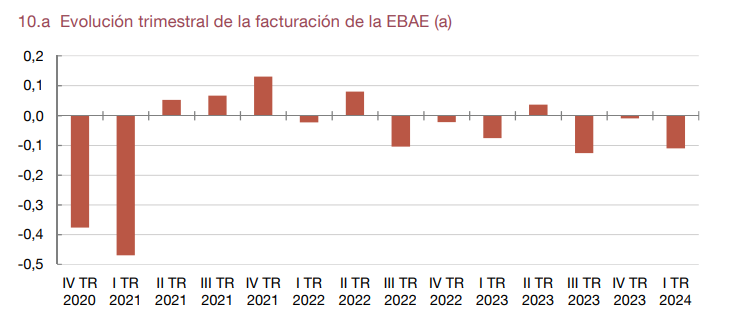We could consider that, in 2024, the financial challenges faced by Spanish companies come from two sources: weak economic activity and problems related to access to financing (high interest rates, strict criteria for access to credit, increased demand for loans, etc.).
Therefore, in this article we show you in greater detail these causes, the challenges that arise from them and the financial strategies that Spanish SMEs can carry out to overcome them.

Índice
What challenges do companies face in 2024?
As indicated by the macroeconomic projections of the Spanish economy, published by the Bank of Spain, the first quarter has been characterized by lower than expected growth in the euro zone. In addition, it is expected to continue being moderate during 2024.
Regarding the Spanish economy, although it experienced an acceleration in the pace of growth in the fourth quarter of 2023, it has once again shown signs of slowdown during the first months of 2024.
To reduced business activity we must add the high cost of credit to determine the main threats that Spanish companies face in 2024.
Activity and credit situation for the company
If we look at the Gross Domestic Product (GDP), we can see a growth of 2.5% in 2023, which contrasts with the 5.8% registered in 2022.
Thus, we could consider that economic activity does not show all the necessary dynamism, as can be seen in the following graph.
This information is confirmed by observing the Bank of Spain Survey on Business Activity (EBAE), which points to a decline in turnover during the first quarter of 2024, although in this aspect there is great heterogeneity between the sectors of the economy.

Regarding the financing received by households and companies, it continues to be weak; with high costs. Now, interest rates are beginning to register certain reductions, perhaps in anticipation of a change in monetary policy by the European Central Bank (ECB).
The January 2023 Bank Loan Survey, published by the Bank of Spain, indicates that there is an increase in the demand for credit by non-financial companies, along with a tightening of the loan approval criteria and the general conditions of new operations.
Opportunities and threats for companies in 2024
Based on what was stated above regarding the situation of activity, company financing and economic risks for businesses in 2024, we could highlight the following challenges they face:
- Diversify in order to reduce uncertainty regarding macroeconomic projections and geopolitical tensions.
- Monitoring and effective management of cash flows. That is, management of short-term financial resources.
- Obtain capital that allows long-term financing at a competitive cost.
- Circumvent the strict criteria for granting credit through financial innovation.
In short, it is about alleviating the reduction in activity through growth plans while fighting against the problems related to obtaining the necessary financing.
In this context, the job of the chief financial officer (CFO) undergoes a metamorphosis, no longer focusing on accounting control to take an active part in business strategy.
Financing strategies for SMEs in Spain
Liquidity management takes a leading role, since it allows the development of daily activity and avoids falling into insolvency problems.
Therefore, the first strategy necessary to address existing threats is to maintain adequate administration of collections and payments, as well as the correct relationship with customers and suppliers.
In this sense, it is possible to maintain economic sustainability in Spanish companies through the use of products that serve as a means of payment and financing at the same time, such as factoring and the confirming.
Furthermore, these types of instruments facilitate the company's opening to the outside world, providing opportunities to increase activity through the conquest of new markets.
On the other hand, it may be appropriate to find investment solutions for long-term businesses that allow financing the 100% of the value of the equipment, preserving available liquidity and hedging against possible spikes in inflation.
In this aspect, Spanish companies can opt for the leasing. In this way, in addition to achieving more flexible economic conditions, they also obtain a series of tax advantages (accelerated amortization). All of this also has an impact on an increase in available liquid assets.
Regarding access to credit, due to the impact of monetary policy and the rigidity of the banking system, it is necessary to resort to the new financing trends in Spain and opt for alternatives to banking, such as debt funds.
In summary, the strategies necessary to face the threats and challenges for Spanish companies in 2024 are based on business planning and adequate financial management that takes into account short- and long-term economic needs.
At Alter Finance we are specialists in alternative financing for companies and we can help you find the solution that best suits your needs.

